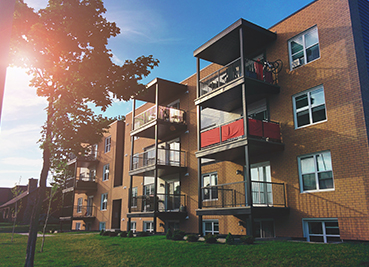
As seen on The Denver Gazette
As housing prices soar in the Denver area, a City Council committee is expected to discuss a proposal that supporters say would build and maintain more affordable units.
The proposed program would ensure that developers create affordable units along with market rate condos and apartments.
Builders and Realtors, however, have doubts whether those plans will help or hurt housing in the neighborhoods that were disrupted the most by the pandemic and whether the proposed guidelines will actually deliver more affordable and workforce housing.
The Land Use, Transportation and Infrastructure Committee is set to discuss the city’s Expanding Housing Affordability guidelines on Tuesday. If approved by the committee, the proposal would advance to the full City Council for consideration.
On March 14, a group of 25 builders, developers and real estate groups wrote the city’s Community Planning and Development staff, asking whether some of the proposed measures would prove counterproductive in renewing the vitality of the city’s central neighborhoods.
While average housing prices in the Denver area recently passed the $700,000 mark, much of the concern about affordability is centered on downtown, where expensive new projects have mirrored the popularity of trendy areas like lower downtown (LoDo) and River North (RiNo), but where neighborhoods have faced increased crime and homelessness in the wake of the pandemic. Real estate agents cite downtown as one of the few parts of the city where sales were lackluster during COVID-19, while sales in virtually all other neighborhoods took off.
The proposed guidelines would allow builders to either build more affordably priced units as part of any construction, or to pay a fee-in-lieu to offset construction of affordable units elsewhere. Builders in higher priced markets such as downtown and Cherry Creek would be required to build higher numbers of affordably priced units, or pay higher fees, than builders in lower priced areas.
To comply, new units would need to be priced to fit the budget of a tenant or buyer well below the area’s median income (AMI). The guidelines would require that 8% of a project’s units be priced at 60% of AMI for apartments and 80% of AMI for ownership units. Builders can price units closer to market price in exchange for building 12% of their units as affordable.
As a reference point, the AMI for a two-person household (two adults or one adult plus a child) in Denver was around $84,000 in 2021, according to the city.
In higher priced areas, the city would require developers to build 10% of their units as affordable, or 15% for units priced closer to the market rate. Builders of smaller scale projects, nine units or fewer, would pay a “linkage fee” to support the city’s affordable housing fund in lieu of adding units to the project.
The proposed plan would allow some wiggle room for special arrangements that would align with the city’s goals as alternatives to full compliance, such as offering parking exemptions for projects that exceed the requirements. Project concept plans filed before June 30 could avoid the proposed requirements if they receive final site development approval from the city before September 2023.
That timing is one of the factors that builders questioned in their March 14 letter to Denver Community Planning and Development’s Analiese Hock, principal city planner.
“As you know, there are legitimate concerns about the City not currently having the staffing necessary to process approvals in a timely manner,” they wrote.
Builders privately expressed concerns that the city’s processing time for permits had slid considerably over the course of the pandemic, and that a rush of new development plans timed to beat the guidelines would create an even greater load.
Officials who signed the letter warned that more stringent requirements for areas defined as “high markets” could actually have the opposite effect — steering developers away from projects in parts of the city that need them most. Those groups included the Denver Metro Chamber of Commerce, Cherry Creek Area Business Alliance, Denver Metro Association of Realtors, Urban Land Institute, and developers L. C. Fulenwider and McWhinney.
They cautioned that the guidelines could weaken incentives to serve “the missing middle” of the market — buyers and renters who are close to the area median income — and might discourage developers from creating larger condos and apartments that better suit larger families and unique living situations.
Meanwhile, a numbers of builders and agents are seeing a challenge in reviving the city’s central neighborhoods.
“It’s very unfortunate, the transient drug use, urban camping, sleeping in rights of way,” said broker Brad Arnold, who marketed some of LoDo’s most prominent projects by East West Partners, including the 334-unit Coloradan luxury condominium overlooking Union Station, which sold out two years ago.
“That area (around Union Station) was such a vibrant and activated place in 2019 and it has since been an unpleasant place to be,” said Arnold. He is now marketing The Arbory in City Park West, a new project two miles east of downtown, where he can deliver a one-bedroom for around $440,000.
Other builders note the need for a comeback of upper areas of downtown surrounding the 16th Street Mall. That area had been the image of successful urban redevelopment when the mall, designed in part by I.M. Pei, opened in 1982. It was flanked by the May Company paraboloid, new lofts created from the old Denver Dry department store, a renovated Paramount Theatre and other landmarks that came later, including Denver Pavilions.
But according to some, upper downtown has taken on a down-at-the-heels look in recent years. It was especially hit hard by office workers leaving in droves in 2020 as they began working remotely, and the Black Lives Matter protests that caused damage, vandalism and forced many businesses to board their windows. Denver Mayor Michael B. Hancock recently launched a $149 million renovation of the mall.
“Downtown is trying to come back, and what will solve that is more residential development down there,” said Carl Koelbel, chief operating officer of Koelbel Urban Homes, which has a long history of trend-setting urban projects in Denver neighborhoods, including RiNo.
Builders and agents also doubt whether the affordable homes would actually end up serving the “teachers, firefighters, restaurant workers” and others the city has cited as a motivation for the plan. They noted that previously mandated affordable housing in Denver and other cities experienced problems in enforcement measures that run against strong market pressures in popular areas.
“This has been a roller coaster,” says Kentwood agent Dee Chirafisi, who did around $132 million in sales last year, most of it in downtown, including some sales in McGregor Square, the luxury condominium/hotel/office project across from Coors Field, which is now nearly sold out.
Although sales had been generally slower in downtown during the pandemic, “it’s really rebounding now,” Chirafisi said. “Buildings with good security are doing fine,” she added, citing the Four Seasons, Waterside Lofts on Riverside Park and McGregor Square as examples. She noted, though, that security has a cost, passed on to buyers in higher HOA fees.
In response to the letter from developers and agents, Hock said the city had provided “ample advance notice” of deadlines for submitting project concepts in advance of the proposed heightened restrictions. Hock also said the city would produce an updated map defining which areas of the city would carry the tighter restrictions applied to high-cost markets and would update the data every three years to reflect the pricing situation on the ground.
Hock reminded the group that the plan does include some incentives for specific purchase units serving the “missing middle,” in the form of parking and permit fee reductions, linkage fee exemptions and height increases. She noted that the most recent draft of the proposed guidelines raised the size triggering a higher linkage fee on some three-bedroom homes.
However, builders are not the only ones less than satisfied with the proposal. Housing and homeless advocates, who largely support the proposal, wish that it went further in mandating affordable units as part of future development.
“The most significant issue is that nowhere in the proposal are required units under 50% of AMI,” said longtime housing advocate Terese Howard, now lead organizer for Housekeys Action Network Denver. “It’s important for the public to know this is not a housing plan to create for people that are really low income, for people who are homeless, who are working part time at minimum wage. This is for people who are middle income and above.”




